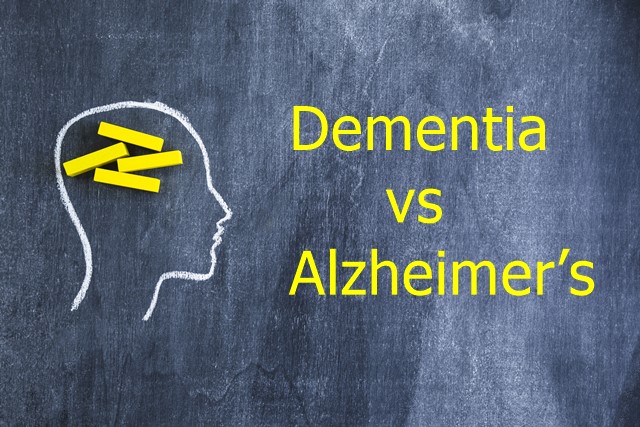
Image Source: FreePik
With each phase of life comes both newfound wisdom and a new set of challenges. For more than 50 million people worldwide, one of those challenges is dementia, a not all too uncommon cause of memory loss. Despite the condition’s relative frequency, dementia is often confused with a different, albeit similar, diagnosis that’s also associated with memory loss – Alzheimer’s Disease.
What is dementia?
First, let’s define dementia. Dementia itself is not a disease but rather an overall term for a decline in cognitive function that affects daily living, including memory, thinking, and social capabilities. It typically occurs in senior citizens; however, it’s important to note that dementia is not a normal part of the aging process. (See also: 5 Ways of Recognizing the Signs of Early Dementia)
What is Alzheimer’s disease?
Alzheimer’s on the other hand, is a progressive disease of the brain and is a type of dementia. About 60 percent to 80 percent of people who have dementia have Alzheimer’s, making it the most common cause of dementia. Over time, Alzheimer’s causes memory and cognitive impairment. (See also: 8 Stages of Alzheimer’s Disease)
What are the differences between dementia and Alzheimer’s disease?
Besides the fact that Alzheimer’s is a disease of the brain and dementia is a syndrome, the main difference between the two is that Alzheimer’s is a degenerative condition with no cure at the present time. There are a few key differences in the symptoms and treatment of each condition that caretakers should also be aware of.
Symptoms
Because it is a broader diagnosis, dementia symptoms vary largely and include issues with memory, communication, concentration, judgment, and visual perception. Alzheimer’s disease is more specific to memory loss as the primary symptom. It is also more commonly associated with behavioral changes, although late-stage dementia patients can also exhibit similar changes in behavior. Alzheimer’s symptoms begin as plaques and tangles in the brain block nerve signals and cause damage to the nerve cells. Because Alzheimer’s disease is progressive, the symptoms such as memory loss become worse over time and are often accompanied by aggression or confusion over the cognitive decline.
Treatment
Presently, there is no cure for Alzheimer’s, but the individual symptoms can be treated as needed through medication and lifestyle changes. Some forms of dementia; however, can be treated with medicine. Regardless of whether it is dementia or Alzheimer’s, early diagnosis can significantly improve the quality of life for both patients and their caregivers. Access to specialized health care and support can be life-changing for dementia patients.
Should I move my loved one into an assisted living facility?
Caring for a relative with dementia often falls on the person’s children or other close relatives, but being a caregiver is a major time commitment for anyone without professional help. As many as 16 million Americans provide unpaid care for people with dementia! When deciding whether to move a loved one into an assisted living facility, it’s important to weigh the cost-benefit of being a full-time caregiver.
Although not necessary for all persons with dementia and Alzheimer’s, facilities like Colorado Assisted Living Homes can provide your loved ones in need of memory care with a supportive and enjoyable living environment. Their skilled caregivers are experienced in providing the necessary care for seniors suffering from dementia and Alzheimer’s disease.
As the condition worsens with age, the difficulty of performing activities of daily living, or ADLs, may increase, making it difficult (or even dangerous) to live alone. ADLs are the biggest indicator of whether someone needs part-time or even full-time assistance. If your loved one has recently experienced a significant cognitive of physical decline that reduces their ability to perform ADLs, it may be time to have them evaluated for assisted living. There are facilities with varying levels of care depending on how much or how little assistance they will need.
Overall, the symptoms and treatment of both dementia and Alzheimer’s are remarkably similar, likely due to the fact that so many individuals have both. Most facilities equipped to deal with memory care will be able to care for loved ones with either dementia or Alzheimer’s. The number of people worldwide with dementia is projected to grow to as many as 152 million people by 2050 according to the World Health Organization, so it’s in all of our best interest to learn how we can better take care of our seniors.
About The Author:
Kat Helgeson comes from a ten-year career in social media marketing and content creation. She takes pride in her ability to communicate the culture and values of an organization via the written word. Kat is also the author of numerous books for young adults. Her titles have received the Junior Library Guild Award, the Bank Street College of Education Best Books of the Year Distinction, and been featured on the Illinois Reads selection list. Her work has been translated into Dutch and German. She has written several informative and educational pieces for Colorado Assisted Living, who provide quality and loving assisted living care for seniors in Littleton and Centennial, Colorado.




